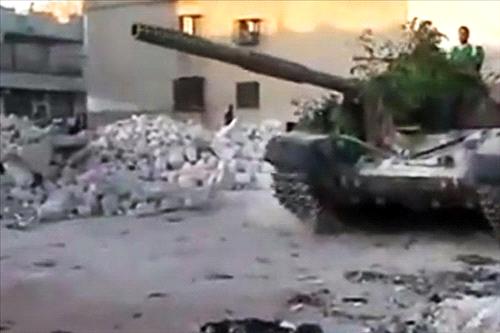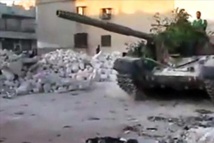Two children were among at least 20 people killed in Aleppo on Tuesday, according to the Syrian Observatory for Human Rights, a Britain-based group that relies on activists and other witnesses in Syria.
Air strikes on rebel-held areas Sunday and Monday killed 86 people, including 32 children, the Observatory said.
Aleppo, Syria's second city and onetime commercial hub, emerged as a key front after a rebel offensive last year. The northern city is today split between regime and rebel-controlled enclaves.
An estimated 126,000 people have been killed in Syria's civil war, which erupted after a brutal crackdown on pro-democracy protests first held in March 2011.
International humanitarian organisation Doctors Without Borders (MSF) corroborated reports that regime helicopters started dropping barrel bombs on Aleppo on Sunday.
In just two cases -- the targeting of a school and a roundabout where people wait for public transport -- "there were dozens of dead and injured people," MSF Syria coordinator Aitor Zabalgogeazkoa said.
"A dozen bodies were being lined up in front of three hospitals waiting to be recovered by the families."
"The hospitals in the area are overrun and are asking for medical supplies. We sent them immediately," Zabalgogeazkoa said.
Earlier, the Observatory and activists said the air force had been dropping barrels of explosives from both helicopters and fixed-wing aircraft.
Observatory director Rami Abdel Rahman said there was a "marked escalation" in attacks, and that "this type of intensive bombing over several days demonstrates the desire of the army to advance" on rebel-held areas.
The opposition National Coalition said the "systematic raids on Aleppo demonstrate the regime's rejection of a political solution" to the war.
It also accused the international community of "indifference" and of being "seemingly incapable of taking a firm position to guarantee a stop to the bloodshed."
The violence in Syria appeared to spill over into neighbouring Lebanon again on Tuesday, when a car exploded and caused an unknown number of casualties near a Hezbollah post in the east of the country.
In a separate incident, several rockets rained down on the eastern Lebanese town of Hermel, a Hezbollah bastion, with one hitting an army barracks and wounding two soldiers, the Lebanese military said.
Hezbollah, a Lebanese Shiite movement, has been the target of repeated attacks by suspected Sunni hardliners since its leader, Hassan Nasrallah, confirmed in April that its fighters were in Syria supporting Assad's forces.
Doctor 'died in detention'
In London, meanwhile, Britain accused Syria of effectively murdering Abbas Khan, a 32-year-old orthopaedic surgeon from south London who had travelled to Aleppo last year to help civilians but was captured by the regime.
His family said the father of two had died in detention, just days before he was due to be freed and handed over to a British lawmaker.
Syrian officials reportedly said Khan had committed suicide, but British junior Foreign Office Minister Hugh Robertson said the regime was responsible.
"There is no excuse whatsoever for the treatment that he has suffered by the Syrian authorities, who have in effect murdered a British national who was in their country to help people injured during their civil war," Robertson told the BBC.
Observatory director Rami Abdel Rahman told AFP "there is an overwhelming likelihood he died of torture, because there are hundreds of similar cases in which the regime says a prisoner committed suicide when in fact they were tortured to death."
In The Hague, meanwhile, top officials from the Organisation for the Prohibition of Chemical Weapons were meeting to discuss the hectic pace of the UN-backed plan to rid Syria of its entire chemical weapons stockpile by mid-2014.
The officials hope to agree Tuesday on how to get the most dangerous chemicals out of Syria, with several countries having already announced offers to help.
The OPCW had set itself a December 31 deadline for the most dangerous chemicals to be removed.
But it now calls this a "target date," and diplomats familiar with the matter say the target is unlikely to be met.
------------------------------------------------------------------------------------------------
Air strikes on rebel-held areas Sunday and Monday killed 86 people, including 32 children, the Observatory said.
Aleppo, Syria's second city and onetime commercial hub, emerged as a key front after a rebel offensive last year. The northern city is today split between regime and rebel-controlled enclaves.
An estimated 126,000 people have been killed in Syria's civil war, which erupted after a brutal crackdown on pro-democracy protests first held in March 2011.
International humanitarian organisation Doctors Without Borders (MSF) corroborated reports that regime helicopters started dropping barrel bombs on Aleppo on Sunday.
In just two cases -- the targeting of a school and a roundabout where people wait for public transport -- "there were dozens of dead and injured people," MSF Syria coordinator Aitor Zabalgogeazkoa said.
"A dozen bodies were being lined up in front of three hospitals waiting to be recovered by the families."
"The hospitals in the area are overrun and are asking for medical supplies. We sent them immediately," Zabalgogeazkoa said.
Earlier, the Observatory and activists said the air force had been dropping barrels of explosives from both helicopters and fixed-wing aircraft.
Observatory director Rami Abdel Rahman said there was a "marked escalation" in attacks, and that "this type of intensive bombing over several days demonstrates the desire of the army to advance" on rebel-held areas.
The opposition National Coalition said the "systematic raids on Aleppo demonstrate the regime's rejection of a political solution" to the war.
It also accused the international community of "indifference" and of being "seemingly incapable of taking a firm position to guarantee a stop to the bloodshed."
The violence in Syria appeared to spill over into neighbouring Lebanon again on Tuesday, when a car exploded and caused an unknown number of casualties near a Hezbollah post in the east of the country.
In a separate incident, several rockets rained down on the eastern Lebanese town of Hermel, a Hezbollah bastion, with one hitting an army barracks and wounding two soldiers, the Lebanese military said.
Hezbollah, a Lebanese Shiite movement, has been the target of repeated attacks by suspected Sunni hardliners since its leader, Hassan Nasrallah, confirmed in April that its fighters were in Syria supporting Assad's forces.
Doctor 'died in detention'
In London, meanwhile, Britain accused Syria of effectively murdering Abbas Khan, a 32-year-old orthopaedic surgeon from south London who had travelled to Aleppo last year to help civilians but was captured by the regime.
His family said the father of two had died in detention, just days before he was due to be freed and handed over to a British lawmaker.
Syrian officials reportedly said Khan had committed suicide, but British junior Foreign Office Minister Hugh Robertson said the regime was responsible.
"There is no excuse whatsoever for the treatment that he has suffered by the Syrian authorities, who have in effect murdered a British national who was in their country to help people injured during their civil war," Robertson told the BBC.
Observatory director Rami Abdel Rahman told AFP "there is an overwhelming likelihood he died of torture, because there are hundreds of similar cases in which the regime says a prisoner committed suicide when in fact they were tortured to death."
In The Hague, meanwhile, top officials from the Organisation for the Prohibition of Chemical Weapons were meeting to discuss the hectic pace of the UN-backed plan to rid Syria of its entire chemical weapons stockpile by mid-2014.
The officials hope to agree Tuesday on how to get the most dangerous chemicals out of Syria, with several countries having already announced offers to help.
The OPCW had set itself a December 31 deadline for the most dangerous chemicals to be removed.
But it now calls this a "target date," and diplomats familiar with the matter say the target is unlikely to be met.
------------------------------------------------------------------------------------------------









 Home
Home Politics
Politics











